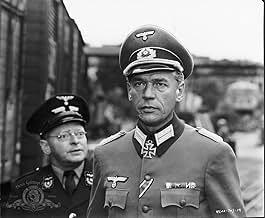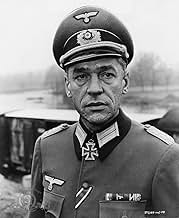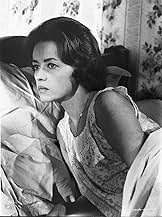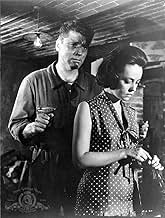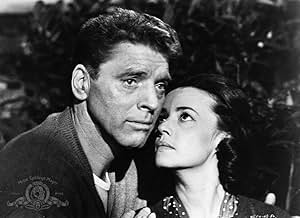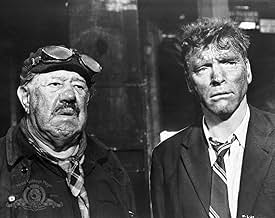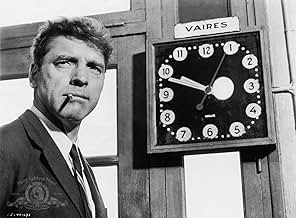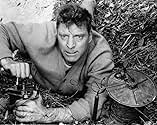En 1944, un coronel alemán carga un tren con tesoros de arte franceses para enviarlos a Alemania. La Resistencia debe detenerle sin dañar el cargamento.En 1944, un coronel alemán carga un tren con tesoros de arte franceses para enviarlos a Alemania. La Resistencia debe detenerle sin dañar el cargamento.En 1944, un coronel alemán carga un tren con tesoros de arte franceses para enviarlos a Alemania. La Resistencia debe detenerle sin dañar el cargamento.
- Dirección
- Guión
- Reparto principal
- Nominado para 1 premio Óscar
- 1 premio y 3 nominaciones en total
- Didont
- (as Albert Remy)
- General Von Lubitz
- (as Richard Munch)
- Sergeant Schwartz
- (as Donal O'Brien)
- Pilzer
- (as Art Brauss)
- Major
- (as Jean-Claude Berco)
Reseñas destacadas
The film begins in Paris, August 2, 1944
It's 1511th day of German occupation The liberation of Paris seems very close
Nazi Colonel Von Waldheim (Paul Scofield) decides suddenly to remove by train to Germany the best of Impressionist masterpieces His objective is clear: "Money is a weapon. The contents are as negotiable as gold and more valuable."
Mademoiselle Villard (Suzanne Flon) informs the Resistance of the shipment The Resistance reaction is to stop the train without damaging the national heritage "They are part of France." But stopping the train is not a simple task You can get killed especially if you are French and the train is German
Labiche (Burt Lancaster), the Chief Inspector of the French Railway System, is not impressed However, he never communicates his political, ideological, or nationalistic convictions, "For certain things, we take the risk," he said; "but I won't waste lives on paintings."
When an aged engineer, Papa Boule (Michel Simon), is accused of sabotage in spite of saving the train through the Allied's bombs at the risk of his own life, Labiche is forced into combat
It begins with a long sequence where an armament train and the art train are both trying to leave the yard in the morning As they are being moved back and forth across the tracks, the viewer knows that British planes will hit the yard in that moment at exactly 10:00 o'clock
New complications are introduced, but the central conflict always returns to an obsessive art lover against a man with no appreciation for art Labiche's only concerns is to slow down the Nazis keeping himself and his compatriots alive
Now, two forces control the film The first is Frankenheimer's cleverness to choreograph the real trains Frankenheimer and his cinematographers capture the heat of the engines, the noise and sound of the cars in motion, the fault in the oil line, the crushing strength implicated when the machines come into collision and the derailment The second force is Lancaster, the "headache" of the fanatical obsessed Colonel whose desire is to see the priceless paintings in Nazi Germany...
Burt Lancaster stars as a French train engineer that has to transport the shipment. At first is not a easy task, but he succeeds in the end. Meanwhile he becomes friend with a hotel owner played by French actress Jeanne Moreau (that passed away last year). And the other members of the cast are fine. Paul Scofield as a German general is great (and Scofield also starred in other great movies after this), and it was a treat seeing French comedian Michel Simon in a war movie (just like Bourvil in THE LONGEST DAY).
This movie had great direction by John Frankenheimer, great performances by all the actors, and also great photography in Black and White. Although a bit dragged in some places, it was still great to watch! And as a fan of the history from 1850 until these days, I liked the movie for his accuracy and his action scenes.
Almost everything that Burt Lancaster does, or experiences in John Frankenheimer's, THE TRAIN seems real, necessary and interesting. He did all his own stunts in the film, learned to cast driving axle-bearings, which we see in the film in a continuous take. Frankenheimer was one of the true masters of the audacious, complicated, continuous scene and this film has many astounding set-pieces. The film is also one of the last great films shot in deep focus black and white (mostly with a 25mm lens) and it is the bold, striking compositions of the intense and vigorous action that elevates the film to an even higher level. Frankenheimer never took the bland, straightforward choices of blocking and positioning the camera in his films - certainly not in the first half of his career and THE TRAIN is a veritable textbook in imaginative visual directing.
There is great sense of danger in the film, much like the feeling that THE WAGES OF FEAR produces - and indeed in one scene, we see an actual train-crash that smashed nine cameras, and was only captured by one camera which yielded one of the most startling shots in all of Cinema! The whole film has sense of almost reckless daring, but was carefully controlled throughout. The scene where Albert Rémy uncouples the engine from the cars is insane! I can't think of another film where a key actor does something so dangerous on their own, with a stunt double.
But all of these scenes and shots serve the story, which is in itself fascinating. It asks the question: What is more important - irreplaceable works of art or the lives of common human beings? Col. von Waldheim is an unorthodox Nazi, who has a deep admiration for 'decadent' paintings and is willing to save them possess or save them at any cost , regardless of his orders. Paul Labiche knows trains inside out, but a painting means as much to him as "a string of pearls to an ape," but his morals are infinitely more compassionate than von Waldheim, which he makes clear without speech at the end - where, in fact, twenty minutes go by without Lancaster uttering a single word, which was unheard of them of a superstar male actor, but it totally appropriate. It is one of the great performances in all of war/action Cinema, I feel. And his antagonist is the legendary Paul Scofield in his first screen appearance in six years, who is, as always, magnificent. Everyone did a first-rate job on this film, yet only the screenwriters were nominated for the 1966 Oscars (the film was not released until May 1965 in the USA) which is yet another example of Academy madness.
Everything about THE TRAIN is unconventional. It was made at a time when other studios and directors would have gone for colour and CinemaScope, Frankenheimer went for deep-focus, black and white 1.66:1, went for authenticity, verisimilitude - no back-projection or models. Arthur Penn actually began the film, but I have never been able to ascertain how much material he shot, or why he was fired, but it would have been a very different movie; Frankenheimer's vigorous, but elegant style is so perfectly right for this film.
One thing that makes some films extra special is those that have many scenes where a process is at work and is shown in detail, seem more powerful. One cannot shown process in any other medium of art. Heist scenes, as in THE ASPHALT JUNGLE, RIFIFI, LE CERCLE ROUGE, etc are prime examples, the escape preparations in Robert Bresson's, A MAN ESCAPED and Jacques Becker's, LE TROU are also enthralling and 'make' each movie what it is. The working out of a life-or-death puzzle, as in BLOW-UP, THE CONVERSATION and De Palma's, BLOW OUT also illustrate the power of the medium. What makes these scenes - 'process of action' - interesting and occasionally powerful, is that they make us look at human interaction with matter is a different, even deeper way. Slow motion cinematography remains one of man's greatest inventions. Before it, we had no idea how fast moving objects worked or behaved. There was over 50 years of gunfire in Cinema, until we saw what a bullet leaving the barrel of a gun looked like, in THE OMEN (1976). It spins, for one thing. That must have surprised many people.
On the whole and after seeing it for the first time in about six years, I firmly feel that THE TRAIN is one of the greatest action films ever made, not only for its audacious crashes, bold style and unobtrusive score by Maurice Jarre, but also for it simply being a fascinating and unusual story this is brilliantly acted.
The centerpiece of the movie is a clash of wills between Von Waldheim, a cultured but iron-backed Nazi colonel (well-played by Paul Scofield) charged with getting the stolen artworks to Germany, and a taciturn railway troubleshooter named Labiche (Burt Lancaster). Von Waldheim first enlists Labiche as 'insurance' against any monkey business during the train's journey. Labiche, though, happens to have Resistance connections and, with serious reservations, is drawn into a desperate, improvised plot to stop the train, preferably without damaging the precious artifacts inside.
Although easily enjoyed as a straight action flick, what gives the film weight is the supporting story, in which Labiche at first argues against wasting precious lives on a few crates of paintings he's never seen, then gradually comes round as he begins to understand that the Nazis are effectively carrying off a large piece of the heart of France. Beautiful deep-focus black and white photography, and solid supporting performances by a mostly French cast (of which Jeanne Moreau may be the best-known), convincingly evoke the bleak misery of the Occupation. John Frankenheimer's economical direction manages to present highly-charged action scenes without glossing over the human cost, as Von Waldheim exacts savage reprisals against escalating efforts to hinder the train's passage.
Lancaster, who performed his own stunts, is excellent, furiously athletic as he slides down ladders, leaps onto moving locomotives, and charges over ridges and fields in pursuit of the train. At the same time, he manages to effectively bring a subtle authenticity to his portrayal of the weary, fatalistic railwayman.
Finally, the action set-pieces are nothing short of stunning, and include the train's mad dash through an Allied carpet-bombing attack, a strafing raid on a speeding locomotive, and several wrecks and derailments, all staged full-scale with period equipment donated by the French national railway. Well worth obtaining on DVD, the film may be hard to find on broadcast television these days.
¿Sabías que...?
- CuriosidadesBurt Lancaster performed all his own stunts in this movie. Albert Rémy also got into the act by performing the stunt of uncoupling the engine from the paintings train on a real moving train.
- PifiasWhen the German officer in the train thinks they've arrived in Germany, he takes a look at his map and we see Strasbourg (Alsace, France), the France-Germany border and Baaden-Baaden (Germany). During German occupation of France, Alsace and Strasbourg were annexed to the German Reich, i.e. this German military map should have shown a different border (100 km West) and Strasbourg should have been in Germany.
- Citas
Colonel von Waldheim: Labiche! Here's your prize, Labiche. Some of the greatest paintings in the world. Does it please you, Labiche? Give you a sense of excitement in just being near them? A painting means as much to you as a string of pearls to an ape. You won by sheer luck: you stopped me without knowing what you were doing, or why. You are nothing, Labiche -- a lump of flesh. The paintings are mine; they always will be; beauty belongs to the man who can appreciate it! They will always belong to me or to a man like me. Now, this minute, you couldn't tell me why you did what you did.
- Créditos adicionalesOpening credits prologue: PARIS August 2-1944 1511th day of German occupation
- Versiones alternativasWhilst the official run time is 133 minutes, the BBFC website has two separate entries, one with a theatrical 'U' rated certificate in 1964 running at 141 minutes 31 seconds and the other entry with a theatrical 'A' rated certificate in 1959 running at 90 minutes 37 seconds. Though the second entry seems incorrect due to the erroneous date of certification being 21 October 1959 (the film was being made in 1963 and is copyrighted in 1964) and a much shorter run time, the BBFC reference numbering is in sequence with the later video rated entries so it is unknown if this 1959 entry is a much shorter cut of this film or this is an error in the BBFC records. It is also not known if the 142 minute entry is a longer cut of the film that has simply not been since it's UK theatrical release in 1964.
- ConexionesFeatured in Film Review: Burt Lancaster (1968)
Selecciones populares
- How long is The Train?Con tecnología de Alexa
Detalles
- Fecha de lanzamiento
- Países de origen
- Idiomas
- Títulos en diferentes países
- The Train
- Localizaciones del rodaje
- Acquigny, Eure, Francia(trains pile-up, 49°10'22.73"N, 1°10'44.84"E)
- Empresas productoras
- Ver más compañías en los créditos en IMDbPro
Taquilla
- Presupuesto
- 6.700.000 US$ (estimación)
- Duración
- 2h 13min(133 min)
- Color
- Relación de aspecto
- 1.66 : 1


